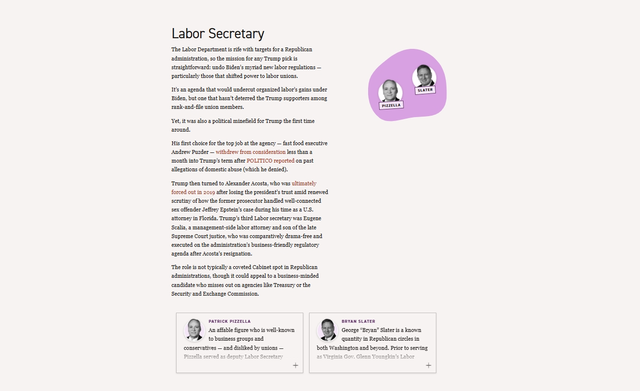 商务部长
商务部长商务部是各种机构的大杂烩,从商业发展到经济制裁、关税和人口普查。虽然通常是一个低调的主力机构,但特朗普将其提升以帮助实施其新面貌的贸易政策。
在其工业和安全局 (Bureau of Industry and Security) 的领导下,商务部在制定针对外国的经济制裁和贸易限制方面发挥了核心作用。商务部长的任务是促进美国在海外的贸易利益,这是特朗普“美国优先”经济信息的核心部分。在特朗普执政期间,该机构也是对钢铁和铝征收关税的关键,这些关税对盟友和对手都造成了打击,并且是改变美国人口普查的命运多舛的尝试。
在拜登政府的领导下,国务卿吉娜·雷蒙多(Gina Raimondo)已将该机构重新转向盟友,在其印太经济框架(Indo-Pacific Economic Framework)四个部分中的三个部分的谈判中发挥了关键作用,为美国在南亚的贸易伙伴设定了新的投资网络以及自愿劳工和环境标准。但她继续通过对 BIS 的制裁和贸易限制,将该机构作为对抗中国、俄罗斯和其他对手的武器——无论谁赢得白宫,这些努力都可能升级。
Commerce SecretaryThe Commerce Department is the hodgepodge of agencies ranging from business development to economic sanctions, tariffs and the census. While typically a low-profile, workhorse agency, Trump elevated it to help implement his new-look trade policy.
Under its Bureau of Industry and Security, Commerce played a central role in setting economic sanctions and trade restrictions against foreign nations. The secretary of Commerce has been tasked with advancing U.S. trade interests abroad, a core part of Trump’s “America First” economic message. Under Trump, the agency was also key to enacting tariffs on steel and aluminum that hit allies and adversaries alike, and an ill-fated attempt to alter the U.S. Census.
Under the Biden administration, Secretary Gina Raimondo has pivoted the agency back toward allies, playing a key role in negotiating three of the four sections of its Indo-Pacific Economic Framework, setting new investment networks and voluntary labor and environmental standards for U.S. trading partners in South Asia. But she has continued weaponizing the agency against China, Russia and other adversaries through sanctions and trade restrictions at BIS
— efforts likely to escalate no matter who wins the White House.
劳工部长
劳工部(Labor Department)的共和党政府目标很多,因此特朗普选择的任何人选的任务都很简单:撤销拜登的无数新劳动法规——特别是那些将权力转移到工会的法规。
这一议程会削弱拜登领导下有组织劳工的收益,但并没有阻止基层工会成员中的特朗普支持者。
然而,这也是特朗普第一次面临的政治雷区。
他在该机构最高职位的第一人选——快餐业高管安德鲁·普兹德(Andrew Puzder)——在POLITICO报道了过去的家庭暴力指控后(他否认了),特朗普上任不到一个月就退出了考虑。
特朗普随后转向亚历山大·阿科斯塔(Alexander Acosta),后者最终在2019年被迫下台,因为这位前检察官在佛罗里达州担任美国检察官期间如何处理人脉广泛的性犯罪者杰弗里·爱泼斯坦(Jeffrey Epstein)的案件,因此失去了总统的信任。特朗普的第三任劳工部长是尤金·斯卡利亚(Eugene Scalia),他是一名管理层方面的劳工律师,也是已故最高法院大法官的儿子,在阿科斯塔辞职后,他相对来说没有戏剧性,并执行了政府对商业友好的监管议程。
在共和党政府中,这个职位通常不是一个令人垂涎的内阁席位,尽管它可能会吸引错过财政部或证券交易委员会等机构的有商业头脑的候选人。
Labor SecretaryThe Labor Department is rife with targets for a Republican administration, so the mission for any Trump pick is straightforward: undo Biden’s myriad new labor regulations — particularly those that shifted power to labor unions.
It’s an agenda that would undercut organized labor’s gains under Biden, but one that hasn’t deterred the Trump supporters among rank-and-file union members.
Yet, it was also a political minefield for Trump the first time around.
His first choice for the top job at the agency — fast food executive Andrew Puzder — withdrew from consideration less than a month into Trump’s term after POLITICO reported on past allegations of domestic abuse (which he denied).
Trump then turned to Alexander Acosta, who was ultimately forced out in 2019 after losing the president’s trust amid renewed scrutiny of how the former prosecutor handled well-connected sex offender Jeffrey Epstein’s case during his time as a U.S. attorney in Florida. Trump’s third Labor secretary was Eugene Scalia, a management-side labor attorney and son of the late Supreme Court justice, who was comparatively drama-free and executed on the administration’s business-friendly regulatory agenda after Acosta’s resignation.
The role is not typically a coveted Cabinet spot in Republican administrations, though it could appeal to a business-minded candidate who misses out on agencies like Treasury or the Security and Exchange Commission.
卫生与公众服务部部长
据特朗普第一届政府的官员称,特朗普对HHS部长的要求各不相同,有时甚至是相互矛盾的。
特朗普可能希望一位具有丰富领导经验、执行影响力和让最大的联邦机构之一屈服的强烈意愿的 HHS 领导人。但他也可能选择一位对该机构本身有深入了解的部长,他有能力有效地推动政策,并在参议院确认程序中低调行事。
找到一个兼具这些品质的人——而且他既非常忠诚又不咄咄逼人——可能会很困难。特朗普任命的 HHS 部长可能是利用联邦影响力减少堕胎机会或改变《平价医疗法案》实施方式的关键。
决定如何平衡这些技能可能取决于特朗普最终决定的政策类型,以及哪些政策斗争将消耗潜在政府的大部分精力。
Health and Human Services SecretaryWhat Trump seeks in an HHS secretary varies — and is at times contradictory — according to officials from his first administration.
Trump might want an HHS leader who has significant leadership experience, executive presence and a strong will to bring one of the largest federal agencies to heel. But he might also opt for a secretary with deep institutional knowledge of the agency itself and the ability to effectively move policy and fly under the radar for the Senate confirmation process.
Finding someone with a blend of those qualities — and who is both deeply loyal without being a pushover — could prove difficult. And a Trump-appointed HHS secretary could be key to using federal leverage to reduce abortion access or change how the Affordable Care Act is implemented.
Deciding how to balance those skills could depend on the kinds of policies Trump ultimately settles on, and which policy battles will consume most of a potential administration’s energy.
住房和城市发展部长
特朗普在竞选期间对住房成本上升的担忧不太可能缓和住房和城市发展部(Department of Housing and Urban Development)在他第一届政府期间面临的敌意。
该机构有700亿美元的预算和大约8000名员工——特朗普和他的住房和城市发展部部长本·卡森(Ben Carson)试图削弱这两点。
卡森面临民主党人的批评,指责他的家人参与该机构的运作,他对该机构的使命相对缺乏了解,以及他急于削减预算。但巴拉克·奥巴马(Barack Obama)、特朗普和乔·拜登(Joe Biden)总统之间最大的政策争论是关于“肯定地促进公平住房”(Affirmatively Furthering Fair Housing)规则,这是该机构最公开斗争的中心。
该规则将要求各州和地方跟踪和解决住宅隔离的模式,以获得联邦资金,作为缩小种族贫富差距和改善种族平等的更广泛议程的一部分。它最终成为特朗普在 2020 年竞选期间抓住的东西,作为民主党人想要“废除郊区”的证据,然后在那一年完全废除该规则。
拜登官员去年年初提出了奥巴马时代法规的更新版本,但除非民主党候选人卡玛拉·哈里斯 (Kamala Harris) 在 11 月获胜,否则不太可能最终确定。
Housing and Urban Development SecretaryTrump’s campaign-trail concern about rising housing costs isn’t likely to temper the kind of hostility the Department of Housing and Urban Development faced during his first administration.
The agency has a $70 billion budget and roughly 8,000 employees — two things Trump and Ben Carson, his HUD secretary, sought to wear down.
Carson faced criticism from Democrats about his family’s involvement in the agency’s operations, his relative lack of knowledge about its mission and his eagerness to cut its budget. But the biggest policy whiplash among Barack Obama, Trump and President Joe Biden has been over the Affirmatively Furthering Fair Housing rule, the center of the agency’s most public fight.
The rule would require states and localities to track and address patterns of residential segregation to receive federal funding as part of a broader agenda to narrow the racial wealth gap and improve racial equity. It eventually became something Trump latched onto during the 2020 campaign as evidence that Democrats wanted to “abolish the suburbs,” before scrapping the rule entirely that year.
Biden officials proposed an updated version of the Obama-era regulation early last year, but it’s unlikely to be finalized unless Democratic nominee Kamala Harris wins in November.
